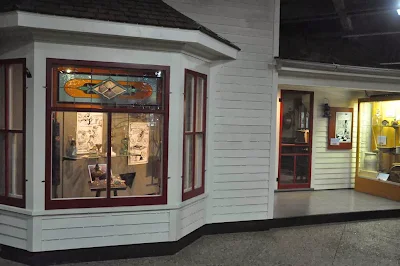This is a claim shanty used by two families to "prove up" two homestead claims in South Dakota after the 1862 Homestead Act signed by President Abe Lincoln. It stood on the property line between the two claims so each family lived on their homestead. Hard to image two large families living in this one room shanty. The 160 acres of government land was "free" after the payment of a small fee, registering the claim, and living on it for five years. But all was not what it seemed. The railroads were granted most of the best land which they sold, their major source of income and profit. The lumber in this shanty was likely delivered by the railroad. Life was never easy on the prairie.
Here is a typical farm house circa 1910 with a wood burning stove for heat and cooking, and the convince of a kitchen with a hand water pump. Many had outside wells with the necessity of carrying water. Upstairs bedrooms were heated, such as they were, by open grills to the warmer first floor.
Here is a typical farm house circa 1910 with a wood burning stove for heat and cooking, and the convince of a kitchen with a hand water pump. Many had outside wells with the necessity of carrying water. Upstairs bedrooms were heated, such as they were, by open grills to the warmer first floor.



The second is obviously more likable...
ReplyDeleteInteresting, I guess these photos were taken in a museum setting.
ReplyDeleteVery interesting to learn how people lived in past times . Helpfull to remember how well we live today..
ReplyDeleteI can't imagine what winter must have been like for them back in the day.
ReplyDeleteSuspect women and children moved into town for the winter so kids could go to school. This still happens today on SD ranches. But someone must stay to care for livestock.
Delete